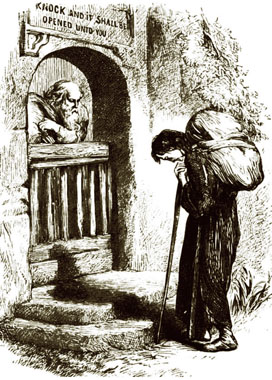A Guide to John Bunyan's The Pilgrim's Progress
Notes and Commentary on
The Pilgrim's Progressby Ken Puls
16. Met by Goodwill
At last there came a grave person to the Gate, named Goodwill, who asked, Who was there? and whence he came, and what he would have?
Christian: Here is a poor burdened Sinner. I come from the City of Destruction, but I am going to Mount Zion, that I may be delivered from the Wrath to come; I would therefore, Sir, since I am informed that by this Gate is the Way thither, know if you are willing to let me in?
Goodwill: I am willing with all my heart, said he; and with that he opened the Gate.
Notes and Commentary
At the Gate Christian is met by a grave yet loving watchman named Goodwill. He is grave because of the serious nature of his duty, answering the knocks of those burdened with sin and snatching them from danger. Yet he is loving because he personifies the willingness of God to receive sinners who come to Him in repentance and faith. In Goodwill we see the compassion and favor that God has for His people even while they are still in their sins. His name hearkens to the song of the angels announcing the birth of Jesus in Luke 2:14 where the hosts of heaven proclaim: "Glory to God in the highest, and on earth peace, goodwill toward men."
At the incarnation of Christ, God's mercy and salvation invaded human history, accomplishing good for both God and man. To God Jesus brought glory. He prayed as the hour of His death drew near: "Father, the hour has come. Glorify Your Son, that Your Son also may glorify You" (John 17:1). Toward men the Savior brought peace and goodwill. But this peace is not a social or a political peace. Jesus Himself said: "Do not think that I came to bring peace on earth. I did not come to bring peace but a sword" (Matthew 10:34). The peace that Jesus brought was a spiritual peaceŅa reconciliation between God and His people accomplished by our merciful Mediator and Great High Priest. The Goodwill of God toward men is particular, there only for those who earnestly seek at the Gate (which as we saw in the last post represents Christ).
It must appear rather odd to many modern evangelicals, with their consumer-oriented, pragmatic approach to evangelism, to find in Bunyan's allegory a closed Gate whose only invitation is the written Word: "knock and it shall be opened unto you" (Matthew 7:7). Certainly, it would seem, a wide-open gate with perhaps some entertainments inside would be more attractive! And the Gatekeeper, why is he not outside swaying the crowd, helping people feel good, and ushering them in? But this is not the offer of salvation we see in Scripture. God would have us escape destruction, turn from sin, flee to Christ alone and live.
Say to them: "As I live, says the Lord GOD, I have no pleasure in the death of the wicked, but that the wicked turn from his way and live. Turn, turn from your evil ways! For why should you die, O house of Israel?" (Ezekiel 33:11).
The salvation offered in the Bible is for those who are weighed down and burdened by sin, and would flee its condemnation. It is a salvation that humbles man and sets the sinner at the mercy of God. It is a salvation that brings "glory to God in the highest" and reaches down in compassion to bring peace and goodwill to men. It is a salvation that is sure and welcoming.
Jesus taught: "All that the Father gives me will come to me, and whoever comes to me I will never cast out" (John 6:37). Consider the gentleness and care in which Jesus invites sinners to Himself: "Come to Me, all you who labor and are heavy laden, and I will give you rest. Take My yoke upon you and learn from Me, for I am gentle and lowly in heart, and you will find rest for your souls. For My yoke is easy and My burden is light" (Matthew 11:28-30). This is truly Goodwill toward men!
Continue Reading 17. Pulled Inside the Gate
Return to 15. Christian arrives at the Gate
The text for The Pilgrim's Progress
and images used are public domain
Notes and Commentary ©1997 Ken Puls"A Guide to John Bunyan's The Pilgrim's Progress"
was originally published from January 1993 to December 1997
in "The Voice of Heritage," a monthly newsletter
of Heritage Baptist Church in Mansfield, TexasUnless otherwise indicated, all Scripture quotations are from
the New King James Version (NKJV) ©1982 by Thomas Nelson, Inc.Return to A Guide to John Bunyan's The Pilgrim's Progress
